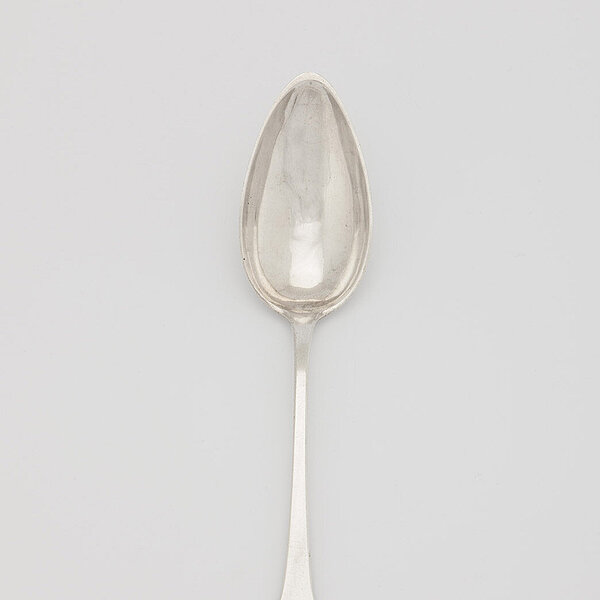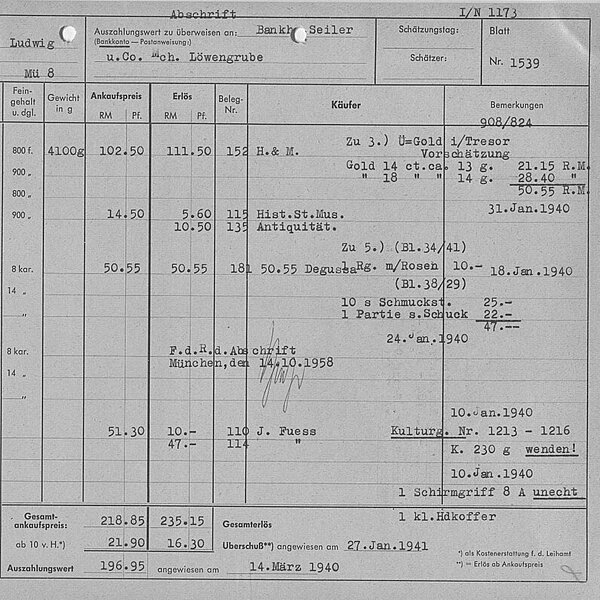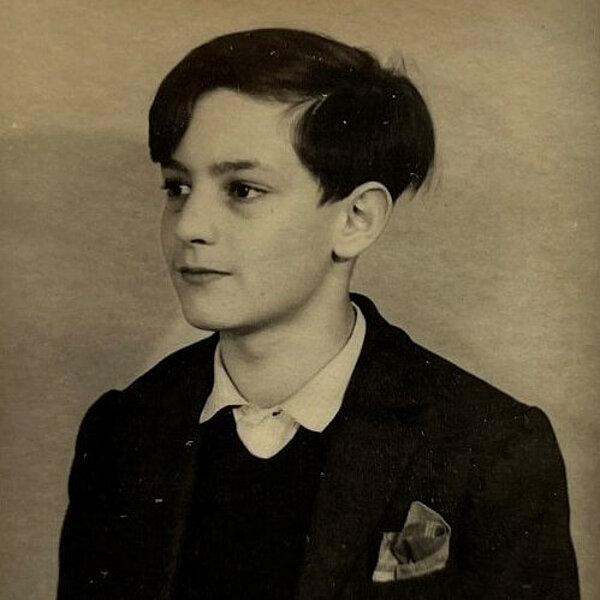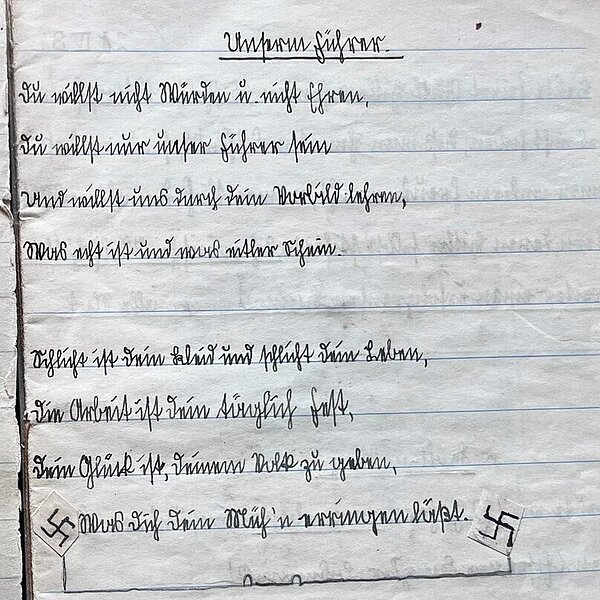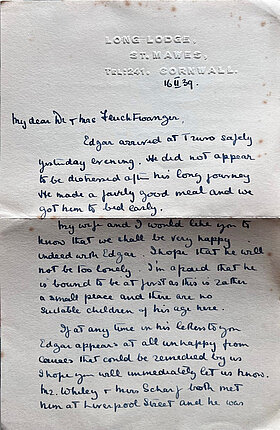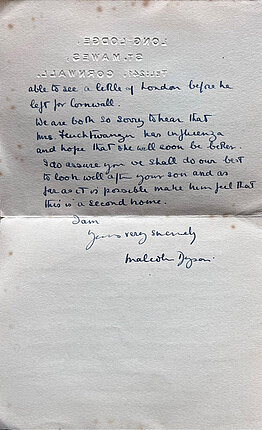Restitution to the Feuchtwanger Family in Winchester, England, of a Silver Spoon Confiscated by the Nazis
On February 21, 1939, the Nazi regime enacted the "Third Decree based on the Ordinance regarding the Registration of Jewish Property". This discriminatory edict required 2,306 Jewish families in Munich alone to surrender all their valuables.
Ludwig Feuchtwanger was one of the people forced to hand over their treasured items, which, in his case, included a silver menorah that had been in the family for generations. On learning of the decree, he realized that the family’s cherished menorah would be confiscated. In anger, he hurled it to the ground and trampled it to pieces. Edgar Feuchtwanger, when speaking to Regina Prinz, recalls his father Ludwig’s reaction to the Nazi decree. That day "my father lost his cool".
The Historisches Stadtmuseum München, as the Museum was then known, acquired, through the Municipal Pawn Office, a silver spoon that had belonged to Ludwig Feuchtwanger. Our provenance researcher, Dr. Regina Prinz, went all the way to Winchester, England, to return the silver spoon to the Feuchtwangers, its rightful owners. The family then kindly donated it to the museum. It is their wish that the public learn about their family history and the circumstances surrounding the confiscation of the spoon.
Ludwig Feuchtwanger was the brother of the famous writer Lion Feuchtwanger. As a critic of the Nazi regime, Lion had been subjected to cruel persecution which had started even before the Nazis came to power. When they took office, he was forced to flee to France in 1933 to live in exile. Ludwig Feuchtwanger chose to remain in Germany and weather the ever-increasing restrictions and discrimination. He worked as a lawyer, ran a publishing house, and was actively involved in Munich’s Jewish Community. He lost his job at the Regional Court in 1933 and was barred from the Reich Chamber of Culture in 1935, leaving him with his position within the Jewish Community alone.
His son, Edgar Feuchtwanger (born 1924), grew up in Munich, near Prinzregentenplatz. He was nine years old when the Nazis seized power in 1933.He showed Regina Prinz pictures from his childhood and old schoolbooks. His elementary school teacher had made the children paint swastikas in class and write birthday greetings to dictator Adolf Hitler in their exercise books. Edgar, a good, diligent student, was forced to take part in this ideological indoctrination. He also told of how his friends gradually began to shun him because of his Jewish faith.
Along with many other Jewish men, his father, Ludwig Feuchtwanger, was, as Edgar put it, "carted off to the Dachau concentration camp" on Kristallnacht in November 1938. He was, however, released in December, and the family immediately got ready to emigrate. Edgar Feuchtwanger was the first to leave, traveling to England alone in February 1939 when he was just 14 years old. He lived with a local family until his parents, Ludwig and Erna Rosine (née Rheinstrom), joined him two months later. The family finally settled in the southern English town of Winchester.
Just 18 months after his imprisonment in Dachau, Ludwig Feuchtwanger was again detained, this time in England, on account of his German nationality. Following his release, he worked as a translator and advisor to the British army. He died in 1947, aged just 61.
Edgar Feuchtwanger did military service from 1943 to 1944. He then studied at Cambridge University where he was awarded his doctorate in 1947. He subsequently taught history at the University of Southampton. In 1981/82, he returned to Germany as visiting professor and taught at the Goethe-University, Frankfurt am Main.
He still lives in Winchester, where he married Primrose in 1962. They have three children.
He has written a book about his childhood in National Socialist Munich entitled "Hitler my Neighbor. Memories of a Jewish Childhood" (available at Penguin Random House) which has been translated into German and published by Siedler-Verlag in 2014 ("Als Hitler unser Nachbar war. Erinnerungen an meine Kindheit im Nationalsozialismus").
Audio Transcript of Conversation (Translation into English)
Edgar Feuchtwanger:
"You had to hand over the silverware. And there was one item, I think it was a menorah, that had been in the Feuchtwanger family for generations – and that also had to go. It was then that my father lost his cool and trampled it to pieces!”
Regina Prinz:
"I have been to the Munich city archives. They have documents from the restitution claim that your mother filed for the silverware. I’ve brought you a copy which you might find interesting. This card here is a very, very important source for us, you always find one in these documents. It’s the 'purchase record'.
The card was always filled out by the Pawn Office staff. It provided a detailed record of the items that had been confiscated. With typical German thoroughness and …"
Edgar Feuchtwanger:
"It’s all a mix of German thoroughness and pedantry – they’re so careful to follow the letter of the law even when they’re committing the most atrocious crimes."
Copy of the Letter
16.02.1939
My dear Mr & Mrs Feuchtwanger
Edgar arrived at Truro safely yesterday evening. He did not appear to be distressed after his long journey He made a fairly good meal and we got him to bed early.
My wife and I would like you to know that we shall be very happy indeed with Edgar. I hope that he will not be too lonely. I’m afraid that he is bound to be at first as this is rather a small place and there are no suitable children of his age here.
If at any time in his letters to you Edgar appears at all unhappy from causes that could be remedied by us I hope you will immediately let us know. Mr. Whiley & Mrs Scharf both met him at Liverpool Street and he was able to see a little of London before he left for Cornwall.
We are both so sorry to hear that Mrs. Feuchtwanger has influenza and hope that she will soon be better. I do assure you we shall do our best to look well after your son and as far as it is possible make him feel that this is a second home.
I am yours very sincerely
Malcolm Dyson
Plan Your Visit
Opening hours
Although the Münchner Stadtmuseum's exhibitions closed on January 8, 2024, for a complete renovation, the cinema and the Stadtcafé will remain open to visitors until June 2027.
Information to Von Parish Costume Library in Nymphenburg
Filmmuseum München – Screenings
Tuesday / Wednesday 6.30 pm and 9 pm
Thursday 7 pm
Friday / Saturday 6 pm and 9 pm
Sunday 6 pm
Contact
St.-Jakobs-Platz 1
80331 München
Phone +49-(0)89-233-22370
Fax +49-(0)89-233-25033
E-Mail stadtmuseum(at)muenchen.de
E-Mail filmmuseum(at)muenchen.de
Ticket reservation Phone +49-(0)89-233-24150

